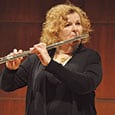Despite a cordial and down-home manner, Francis McBeth was indeed very bright and thoughtful. He wrote often for us but declined to touch on any topic a second time. He chose instead to cover only new ground, and he did this pointedly. He never shied from stating an idea vividly, even bluntly. How many other prominent musicians would proclaim these thoughts in print:
“Many teachers teach by definition instead of explanation. There are a million light years of difference.”
“Most university faculty malinger without pressure from above.”
One of his wise rules was to never send a new work to press until several bands had performed the composition to find unexpected problems. If a passage caused the trumpets to stumble, he questioned himself as to why he had written it that way and substituted something easier.
Another distinction, especially from our viewpoint, is that he was as good a writer as he was a musician, a rarity. In public speaking Francis had a style worthy of any politician and made strong points with a twinkle in his voice. In one of his disparagements of 12-tone music he related how a composing colleague had exclaimed that after reviewing his latest creation he had discovered to his surprise that it was written entirely in 12-tone form. Francis went on, “Do you know the odds against that happening? If you gave an infinite number of monkeys an infinite number of typewriters, the odds of one of them typing King Lear are lesser than someone accidentally writing a composition in 12-tone.”
We have never been able to match wits with McBeth, but once we came close. We sent him an early copy of one issue with an article of his. It was illustrated with a row of pictures of classical composers wearing long white wigs plus a photo of McBeth. However, on his photo we added a similar flowing white wig on his otherwise bald head. He saw this and went ballistic until his wife Mary observed that the wig was just pasted onto his copy. Then he laughed long and heartedly, and told us the story.
Oh, Francis, we will miss you.
– James T. Rohner, Publisher
W. Francis McBeth was born in 1933 in Ropesville, Texas and started playing trumpet in second grade. He earned degrees from Hardin-Simmons University and the University of Texas and served in the 101st Airborne Band at Fort Jackson, South Carolina, and the 98th Army Band at Fort Rucker, Alabama. He taught at Ouachita Baptist from 1957 until retiring in 1996 and was professor of music, chairman of the theory and composition department, and composer in residence there. He wrote many compositions in a long and prolific career, including several that have become part of the standard repertoire of bands around the world. Here is a list of his most notable works.
Canto (Grade 2)
Chant and Jubilo (Grade 3)
Joyant Narrative (Grade 3)
Second Suite for Band (Grade 3)
Kaddish (Grade 4)
Masque (Grade 4)
Beowolf (Grade 5)
Of Sailors and Whales (Grade 5)
To Be Fed by Ravens (Grade 5)
When Honor Whispers and Shouts (Grade 5)




